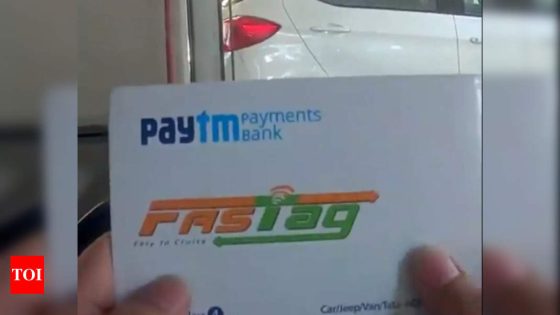February 29 is the last day to complete your Fastag KYC. According to previous order, Fastag that are not KYC-compliant will be deactivated after February 29. But this may change. As according to a report by news agency PTI, atate-owned National Highways Authority of India (NHAI) is likely to extend ‘One Vehicle, One FASTag‘ initiative compliance deadline to March-end
Reason: The problems being face by Paytm Fastag users. According to the report, in view of the problems being faced by Paytm FASTag users, a senior official said that NHAI may extend the deadline by a month. NHAI had earlier proposed to implement ‘One Vehicle, One FASTag’ initiative from March 1.
“In view of the Patym crisis, the FASTAg users may be given more time to shift to one vehicle-one FASTag norm,” the official told PTI on condition of anonymity.
‘One Vehicle, One FASTag’ initiative
To enhance the efficiency of the electronic toll collection system and ensure seamless movement at toll plazas, NHAI has introduced the ‘One Vehicle, One FASTag’ initiative. This initiative aims to discourage the use of a single FASTag for multiple vehicles or linking multiple FASTags to a single vehicle.
RBI to Paytm Payments Bank Ltd
Earlier this month, the Reserve Bank of India (RBI) advised both customers and merchants of Paytm Payments Bank Ltd (PPBL) to transfer their accounts to other banks by March 15. The RBI clarified that PPBL customers can continue to withdraw or utilize balances from their accounts, including savings accounts, current accounts, prepaid instruments, FASTags, and National Common Mobility Cards, without any restrictions, up to their available balance even beyond March 15.
Regarding FASTags, the RBI’s FAQs state that users can still use their existing FASTags to pay tolls up to the available balance. However, after March 15, 2024, no further funding or top-ups will be allowed for FASTags issued by Paytm Payments Bank.
FASTag, with a remarkable penetration rate of around 98 percent and over 8 crore users, has revolutionized the electronic toll collection system in India. It operates through Radio Frequency Identification (RFID) technology, allowing toll payments directly from the linked prepaid or savings account or directly from the toll owner.
Reason: The problems being face by Paytm Fastag users. According to the report, in view of the problems being faced by Paytm FASTag users, a senior official said that NHAI may extend the deadline by a month. NHAI had earlier proposed to implement ‘One Vehicle, One FASTag’ initiative from March 1.
“In view of the Patym crisis, the FASTAg users may be given more time to shift to one vehicle-one FASTag norm,” the official told PTI on condition of anonymity.
‘One Vehicle, One FASTag’ initiative
To enhance the efficiency of the electronic toll collection system and ensure seamless movement at toll plazas, NHAI has introduced the ‘One Vehicle, One FASTag’ initiative. This initiative aims to discourage the use of a single FASTag for multiple vehicles or linking multiple FASTags to a single vehicle.
RBI to Paytm Payments Bank Ltd
Earlier this month, the Reserve Bank of India (RBI) advised both customers and merchants of Paytm Payments Bank Ltd (PPBL) to transfer their accounts to other banks by March 15. The RBI clarified that PPBL customers can continue to withdraw or utilize balances from their accounts, including savings accounts, current accounts, prepaid instruments, FASTags, and National Common Mobility Cards, without any restrictions, up to their available balance even beyond March 15.
Regarding FASTags, the RBI’s FAQs state that users can still use their existing FASTags to pay tolls up to the available balance. However, after March 15, 2024, no further funding or top-ups will be allowed for FASTags issued by Paytm Payments Bank.
FASTag, with a remarkable penetration rate of around 98 percent and over 8 crore users, has revolutionized the electronic toll collection system in India. It operates through Radio Frequency Identification (RFID) technology, allowing toll payments directly from the linked prepaid or savings account or directly from the toll owner.
Source Agencies

